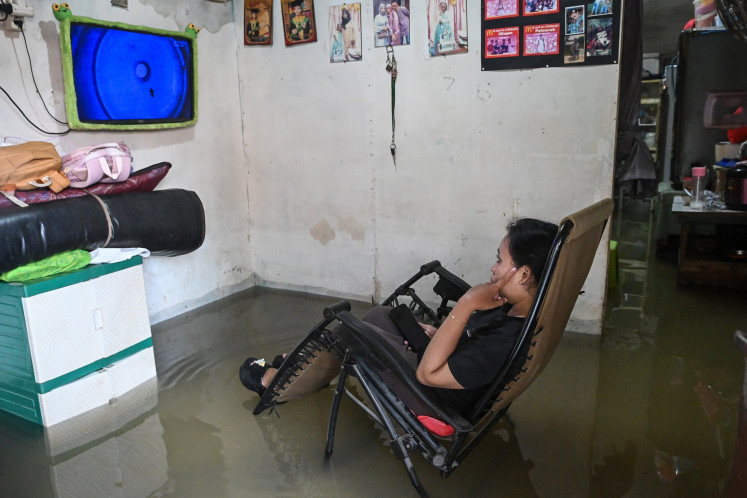Popular Reads
Top Results
Can't find what you're looking for?
View all search resultsPopular Reads
Top Results
Can't find what you're looking for?
View all search resultsWhat can investors expect from the new one-stop system?
President Joko âJokowiâ Widodo launched the eagerly awaited national investment licensing One-Stop Integrated Services (PTSP) at the Investment Coordinating Board (BKPM) on Monday
Change text size
Gift Premium Articles
to Anyone
P
resident Joko 'Jokowi' Widodo launched the eagerly awaited national investment licensing One-Stop Integrated Services (PTSP) at the Investment Coordinating Board (BKPM) on Monday.
It was exactly 90 days after his impromptu visit to the board's office. Ninety days after he acknowledged the prolonged and complicated licensing process required to do business in Indonesia. Ninety days after President Jokowi said, 'One place is enough.'
Licensing issues hamper the improvement of the business climate. After corruption, access to financing and inflation, inefficient government bureaucracy is the biggest barrier to doing business in Indonesia, according to the World Economic Forum's Global Competitiveness Report 2014-2015.
After the inauguration of the national investment licensing one-stop service, what can investors expect to see in the new system?
This new licensing mechanism should take investment service in this country to the next level. There are at least four reasons why this one-stop service matters for both domestic and foreign investors.
First, investment licenses at the national level are now processed under one roof at the BKPM. Investors submit and obtain licensing documents exclusively with the investment board. It is not limited to principal and business licenses issued by the BKPM, but also to permits under the authority of other ministries and other government bodies.
A review of the previous licensing process showed that non public-private partnership (PPP) power plant investors, for instance, had to apply for 52 permits and travel back and forth to 10 different ministries and government bodies.
According to the standard operating procedures (SOP), the whole process would take, incredibly, 1,125 days ' more than three years. Under the new system, the whole process is designed to be 80 percent faster.
Second, starting on Dec. 15, 2014, principal and business license applications have been made available online. While the online application system is being developed gradually for all licenses, investors still have to submit physical documents to the BKPM.
However, all data is processed in an online system accessible through a dashboard called Service Performance Monitoring Dashboard (SPMD). Once investors submit their application, they will get a user ID so they can log in and track the application's progress online.
This dashboard is also accessible for related ministries and government bodies so that all parties can monitor and evaluate the whole licensing process as one system.
Aside from the SPMD, there is a monitoring team assigned at the BKPM who ensures that all components function according to the SOP and relevant regulations.
The national investment one-stop licensing service has also opened a toll-free contact center whose services include providing information and handling complaints.
Third, the end-to-end process of the investment licensing service has been integrated into one system. As of Jan. 23, 22 ministries and government bodies have been integrated in the national one-stop service at the BKPM, including the Industry Ministry, the Culture and Elementary and Secondary Education Ministry, the Food and Drug Monitoring Agency and the National Police.
In total, there are 147 licenses to be processed at the PTSPs, covering business sectors, but excluding the upstream oil and gas and financial sectors.
Besides transferring authority to issue investment permits, the 22 ministries and government bodies have stationed 81 liaison officers at the BKPM to ensure faster handling and to provide consultation service at the front office.
Fourth and finally, as mentioned previously, the investment one-stop licensing service will be implemented both at the national and regional level. The national one-stop service at the BKPM takes care of foreign direct investment (FDI) and strategic domestic direct investment (DDI). At the regional level, the provincial one-stop service handles cross-district DDI, while the district one-stop service manages DDI in their territories.
A trial of the new mechanism at the national level began on Jan. 15 before formal implementation was launched on Jan. 26. In addition, the investment one-stop licensing service at the regional level has been implemented in five provinces and 12 districts. By the end of this year, the government has set a target of integrating 24 provinces and 120 districts into the system.
By 2016, the integrated service will cover all regions across the country, including 34 provinces as well as 561 districts, free trade zones and special economic zones.
Having investment licenses processed in one system and working together under one roof will facilitate better coordination among related parties at the national level.
This allows authorities to reduce the process time, synchronize procedures, avoid authority overlap and eliminate red tape.
_________________
The writer is an investment marketing executive for Asia at the BKPM. This is a personal view.










